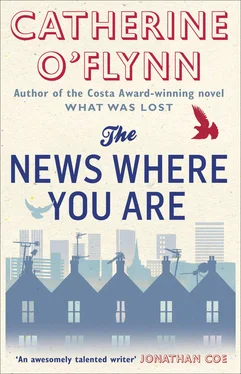The first woman nodded. ‘You should have seen her, though. The weight fell off her, didn’t it? In the end he was pushing her up in a wheelchair.’
Though neither woman had asked, Frank thought he should explain his interest. ‘I’m just trying to help track any next of kin. I know they didn’t have children, but I wondered if you knew of any other relatives.’
The two women blew out their cheeks and chewed their lips as they thought. ‘I can’t think of any, love. It was always just the two of them — self-contained. I know he looked after her when she got ill. She never mentioned anyone else apart from the nurses who’d visit.’
Maz nodded in agreement. ‘She was worried about him, though. Do you remember he’d wheel her in here and she’d send him next door for the paper, cos she wanted a natter without him standing over her? We’d ask her how she was and she’d laugh and say she was only going in one direction. Ever so cheerful, though. Considering some of the people we get in here moaning about all their ailments when there’s sod all wrong with them. Anyway I remember she said she worried about him after she was gone. She said she’d always been the sociable one, the one who’d make an effort with friends; he was more of a loner, I think.’
The other woman nodded solemnly. ‘Looks like she was right to worry. It’s a shame.’
The three of them stood in silence for a moment until Frank spoke. ‘Did he come in after she died?’
‘Very rarely at first, but then he started back at work and would come and get a jam doughnut to take in with him every day.’
Frank looked at her. ‘Work? He was retired, surely.’
‘Oh no. You’d think it, at his age, but he kept on. He had his own business. I think it took his mind off Elsie. What was it Maz? What did he do?’
‘Oh, you’re asking the wrong one here. Something with machines. Engineering? To be honest, love, I probably wouldn’t know even if you told me.’
The other woman closed her eyes to think. ‘It was something to do with tools — you know, something like that. It was on the Silver Street industrial estate in town. I remember that because Elsie used to say it had brought them precious little silver for all the time he spent there.’
Frank thanked them. As he was leaving, they asked if they could take some photos of him on their phones. He posed for various shots in front of the cakes, thumbs aloft with a different woman each time.
They said they’d put them up and start a wall of fame. ‘Who knows who we’ll get in here next. Tell the rest of them about us. Even that stuck-up bit. She looks like she needs to eat a sausage roll or two.’
Frank said he’d be sure to pass that on, grinning at the thought of it, and headed back out into the wind.
He could never reconcile the interior with the exterior of Evergreen. The corridors inside seemed to stretch too far and in too many directions to fit inside the visible shell of the building. He sometimes wondered if the disorientation was a deliberate effect intended to match the residents’ internal confusion with a wider sense of the dreamlike and unreal. The corridors were thickly carpeted and as he walked along an apparently empty stretch he would often be alarmed to turn and find some diminutive figure had appeared behind him, shuffling silently in his wake. Perspective seemed skewed in the long hallways; bedroom doors stretched ahead of him on both sides, diminishing in size towards a vanishing point that retreated at his approach.
Today he and Andrea made slow progress down the corridor, caught behind two women he didn’t know haltingly moving themselves and their Zimmer frames to some assignation.
Andrea looked at the shelves next to every resident’s bedroom door: ‘Do you think we ever really change?’
‘What do you mean?’
‘I mean,’ she lowered her voice, ‘look at these two ahead of us. Do you think in their minds they’re still the same teenage girls they once were, walking up the street to call on their mate, hoping she won’t be wearing the same cardigan as them?’
‘Is that a big worry for teenage girls?’
Andrea ignored him. ‘This place reminds me of school. The shelves outside each room where everyone puts their personal trinkets out on display — framed photographs or ornaments or dried flowers or whatever — everyone’s trying to show who they really are. Just like at school — all of us having to wear school uniform but doing everything we could to show something else, to say “this is the real me”.’
‘Did you do that? I find it hard to imagine you at school.’
‘Of course I did. I’d wear my tie backwards — with the thin bit at the front and the shameful fat part tucked into the shirt. Then there were the badges on my blazer and most importantly the bag. I’d spend hours copying the typeface from albums — like some medieval monk, painstakingly inking “PiL” onto my canvas bag.’
Frank shook his head. ‘You sound like the kind of girl who used to stand at the bus stop and laugh at me when I walked past.’
Andrea was, in fact, already laughing in exactly that way. ‘Why? What did you have written on your bag?’
‘Nothing. Obviously. You know I was clueless. I really had no idea what was going on. I think I was still wearing flares in 1979. I had a nice sensible haircut — a big wiry helmet, eyebrows that had reached adulthood ahead of the rest of me and taken over most of my forehead, plenty of spots, brutal dental brace, obligatory bumfluff on the upper lip. I’m pretty sure I would have worn my tie the right way round, being unaware of just how sickening that was to everyone else. I wrote Supertramp on the front of my homework diary in pencil — I thought that was pretty wild.’
Andrea was laughing gleefully now whilst singing about kippers and breakfast.
Frank looked at her and shook his head: ‘You’re such a bully.’
She tried to stop laughing. ‘Sorry.’ She regained her composure. ‘But the reason we used to do all that was to attract boys or girls or whatever.’ She dropped her voice to a whisper. ‘Do you think maybe that’s what the trinkets are for? I mean maybe it’s a highly evolved coded language. Maybe a clown with an umbrella means “enjoys bridge” or a rabbit pushing a wheelbarrow means “I’m free”.’
‘Please stop.’
The two women with Zimmer frames had pulled over and knocked on a door with a toby jug outside. It was opened by an elderly man with a cravat. Andrea widened her eyes at Frank as they passed by and said nothing.
Halfway along the next corridor they finally came to Maureen’s room. Frank pointed to the empty shelf.
‘Mom’s, of course, is bare.’
‘Well, she’s not the only one — there are some other empty ones.’
‘No, they’re outside unoccupied rooms. She’s the only one with nothing. I suppose the absence says “this is the real me” better than any ornament.’
There was no answer to his knock, so Frank opened the door gently to find his mother dozing in her chair with a newspaper open on her lap. He and Andrea sat on chairs next to her for a while in silence, listening to the gradual escalation of her snores until a particularly violent one woke her up:
‘Oh!’ She always smiled when woken by her own snores. A mixture of embarrassment and humour. It seemed to Frank like a glimpse of her true self, before the veil of melancholy was drawn up again.
‘How long have you been there?’
‘We just arrived.’
‘Hello, Andrea darling. You must think I’m terrible, sleeping in the day.’
‘I do it myself whenever I get the chance.’
Maureen looked around. ‘Where’s little Mo?’
‘She’s at a friend’s party this afternoon.’
Читать дальше












